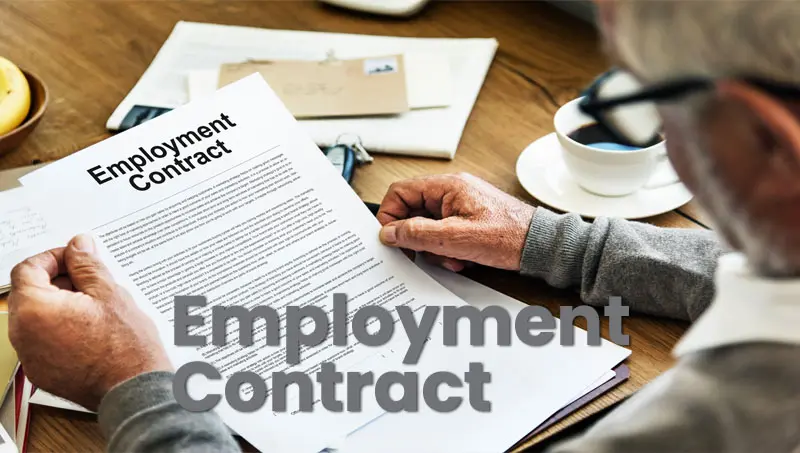Important Considerations for a New Employment Offer – Employment Contracts in the UAE
Last week, I came across a distressing case involving 15 employees. They were hired by the DIFC-registered entity, but the employment offers letter they signed were actually associated with a mainland Dubai company. Complicating matters further, the employer deliberately identified itself as ‘XYZ Group,’ leading employees to assume that working for any of the entities under this umbrella would be governed by a formal employment contract.

This significant discrepancy meant that their legal recourse did not fall under the jurisdiction of the DIFC Small Claims Tribunal, but rather under the Dubai Courts. These individuals had not received their salaries for the past four months or more, adding to their plight.
Despite being provided with accommodation and food, they had no means to send money home or even afford return tickets—a situation aggravated by the fact that their employment offers did not materialize into employment contracts with the same company visa.
Even more peculiar was another case where the 𝑫𝑰𝑭𝑪 𝒆𝒎𝒑𝒍𝒐𝒚𝒆𝒆’𝒔 𝒆𝒎𝒑𝒍𝒐𝒚𝒎𝒆𝒏𝒕 𝒄𝒐𝒏𝒕𝒓𝒂𝒄𝒕 𝒘𝒂𝒔 𝒅𝒆𝒍𝒊𝒃𝒆𝒓𝒂𝒕𝒆𝒍𝒚 𝒔𝒕𝒓𝒖𝒄𝒕𝒖𝒓𝒆𝒅 𝒂𝒔 𝒂 𝙘𝙤𝙢𝙢𝙞𝙨𝙨𝙞𝙤𝙣 𝒄𝒐𝒏𝒕𝒓𝒂𝒄𝒕 𝒘𝒊𝒕𝒉 𝑻𝒉𝒆 𝑳𝒐𝒏𝒅𝒐𝒏 𝑪𝒐𝒖𝒓𝒕 𝒐𝒇 𝑰𝒏𝒕𝒆𝒓𝒏𝒂𝒕𝒊𝒐𝒏𝒂𝒍 𝑨𝒓𝒃𝒊𝒕𝒓𝒂𝒕𝒊𝒐𝒏 (𝑳𝑪𝑰𝑨) 𝒂𝒓𝒃𝒊𝒕𝒓𝒂𝒕𝒊𝒐𝒏—a move so extreme, a concerning example that underscores 𝒉𝒐𝒘 𝒄𝒓𝒊𝒕𝒊𝒄𝒂𝒍 𝒊𝒕 𝒊𝒔 𝒕𝒐 𝒖𝒏𝒅𝒆𝒓𝒔𝒕𝒂𝒏𝒅 𝒕𝒉𝒆 𝒊𝒎𝒑𝒍𝒊𝒄𝒂𝒕𝒊𝒐𝒏𝒔 𝒐𝒇 𝒕𝒉𝒆 𝒋𝒖𝒓𝒊𝒔𝒅𝒊𝒄𝒕𝒊𝒐𝒏 𝒂𝒏𝒅 𝒈𝒐𝒗𝒆𝒓𝒏𝒊𝒏𝒈 𝒍𝒂𝒘 𝒔𝒕𝒂𝒕𝒆𝒅 𝒊𝒏 𝒚𝒐𝒖𝒓 𝒆𝒎𝒑𝒍𝒐𝒚𝒎𝒆𝒏𝒕 𝒅𝒐𝒄𝒖𝒎𝒆𝒏𝒕𝒔.
The Visa-on-Arrival Scheme Exploitation
The employer systematically preferred hiring candidates from Mexico, taking advantage of the visa-on-arrival scheme, which permits a six-month stay under a new employment offer. This method, while ostensibly beneficial for both parties, exploited a significant loophole.
Unaware of the legal requirement for a formal employment contract authorized by competent authorities following the new employment offer, the employees believed they were allowed to work under such visas. Regrettably, some had abandoned stable positions in their home country or in the UAE, enticed by the prospect of better and more secure employment there.
The Ministry of Human Resources and Emiratisation (MOHRE) formal employment offers were issued to them, assuming they had adhered to all formal employment procedures. However, despite working in the DIFC, no further processing took place after receiving the new employment offer. Unfortunately, some employees, upon seeking visa formalization, were summarily terminated without receiving their outstanding salaries and additionally incurred overstay fines.
It is crucial to be vigilant and aware of the law.
This predicament highlights the critical importance of vigilance for every employee when considering a new employment offer or employment contract. It is crucial to insist on a formal employment contract before commencing work that accurately reflects the company you are currently working for.
It is critical to thoroughly review the terms pertaining to your employment, with a particular emphasis on clauses related to deductions, visa costs, and training expenses that the employer intends to recover, as well as non-competition and confidentiality.
Employers frequently include these clauses, even though they are not mandatory, to protect their interests. It is important to remember that you have the right to challenge and demand the removal of any clauses that do not serve your rights or interests and are not compulsory, as mentioned above.
Understanding the Legal Framework of Employment Offers is crucial.
As you embark upon new professional endeavours, it is important to prioritize a thorough understanding of the legal and regulatory framework that governs the new employment offer or contract. When making a new employment offer, a critical step in your pre-employment evaluation is verifying the company’s legal name and jurisdiction.
This is not merely procedural; it has significant implications for your employment contract, the governing law, the applicable court in the event of a dispute, and even the day-to-day aspects of your role. It is important to emphasize that the law does not mandate working on a “trial basis” without an employment contract.
Thus, before formally commencing your employment, it is essential that an employment contract, not just a new employment offer letter, is in place, with careful attention paid to the jurisdiction (place of work) and the applicable law. New Employees must verify the name of the company and the jurisdiction they are working for with their contracts, thoroughly review the contract and relevant clauses and understand the visa process as below:
1) Keep an eye on the Governing Law and Jurisdiction Clause
If you have received a job offer for working within the Dubai International Financial Centre (DIFC) or the Abu Dhabi Global Market (ADGM), the employer should be a DIFC or ADGM company, respectively. The governing law and jurisdiction should be exclusively under DIFC or ADGM laws, as well as the DIFC or ADGM Courts.
A contract issued by an ADGM or DIFC entity is private and does not require an authority, unlike contracts on the mainland, which are typically governed and issued by the Ministry of Human Resources and Emiratisation (MOHRE).
Conversely, if your job offer is from Dubai, Sharjah, or Abu Dhabi, the governing law and jurisdiction should align with the respective emirate Court under a MOHRE Job Offer or Employment Contract (a must).
While “commercial contracts” in DIFC and ADGM may choose the governing law and dispute resolution forum, ‘opting out’ of the established mechanisms and selecting the Dubai Court or other courts for employment scenarios can create a significant burden in terms of delay and cost for employees seeking to resolve employment disputes.
This “forum” tactic potentially hinders employees’ ability to pursue legitimate claims. It is important to note that any employment contract that references UAE Labour Law and the UAE Labour Court, while pertaining to a DIFC/ADGM entity, will result in a jurisdictional challenge for any employment dispute.
2) The process involves verifying the company name and legal structure.
The company name, as specified in your new employment offer and employment contract, plays a crucial role in establishing the legal jurisdiction that will govern your employment. For instance, entities ending in “LLC” are typically mainland companies, and the applicable Employment Law will be Federal Law no. UAE Federal Decree-Law No. 33/2021 and its amendment, and the UAE Courts will decide the employment claim through a MOHRE contract.
Notably, Sharjah Media City (SHAMS) uses “LLC” for its registered companies, and the UAE Courts decide the employment claims pursuant to a transfer by SHAMS.
In contrast, companies with the “LTD” suffix are generally registered within financial-free zones such as the DIFC/ADGM, indicating a different regulatory regime, and employment disputes fall under the DIFC/ADGM Courts.
Other Free zones across the UAE designate specific suffixes for their registered companies, reflecting each zone’s unique regulatory environment. These suffixes—such as “FZ”, “FZCO”, “FZE”, and “DMCC”—serve as indicators of the company’s free zone status and the type of entity it represents, and the UAE Courts decide the employment claims pursuant to a transfer by the relevant free zone. Awareness of these suffixes enhances clarity regarding the regulatory framework and benefits associated with your prospective employer.
Beware of entities issuing offer letters under an unlicensed “Group” entity name. The company’s name should match the trade license and the jurisdiction in which the employee will work.
3) Contracts and Termination Requirements
Before proceeding with visa applications, employers are required to have a written employment contract and not just an employment offer letter for each employee. These contracts necessitate drafting in both Arabic and English for mainland companies and some free zones and in English for DIFC/ADGM, free zones, and offshore companies. The terms should clearly state the position and duties, probationary period, compensation, benefits, termination, and notice requirements.
4) Typical Visa Process
The UAE government has repeatedly underscored the importance of adhering to visa regulations for employment, emphasizing that individuals are permitted to work only if they possess an appropriate employment visa.
It is well-documented that there are five primary types of visas:
- the investment visa, for those who are shareholders in a company;
- the employment visa issued under three categories viz. Category 1: Bachelor’s degree holders; Category 2: Post-secondary diploma holders; and Category 3: High school diploma holders for those employed within the country;
- the spouse’s visa,
- The green visa is open to freelancers, self-employed individuals, skilled employees, and
- golden visa for investors holding assets worth AED 2 million, for entrepreneurs with a project value greater than 500,000, or for specialised talents including inventors, doctors, scientists, athletes, executives, doctoral degree holders, and science and engineering specialists.
Notably, individuals holding a spouse’s or company’s visa may only engage in work if they have obtained a No Objection Certificate (NOC) from their sponsor. This directive aims to ensure that all employment practices are in full compliance with the law, safeguarding the rights and responsibilities of all parties involved. Thus, you are not permitted to work if you are on a visit visa or visa on arrival.
Typical Visa Process for employee (outside the country)
To streamline the employment visa process in the UAE, follow these essential steps:
- Entry Visa Quota Approval: Employers must apply at the Ministry of Labour for entry visa quota approval, especially for free zone companies, with a typical approval time of three working days.
- Employment Contract Submission: Employees sign and return the job offer contract, provided in English, Arabic, and their native language, to ensure clarity on job expectations. This step generally takes two working days online.
- Work Visa Application: Apply for a work visa and entry visa post-approval of the work permit application by the Ministry of Labour, which verifies job suitability for UAE citizens and company legitimacy.
- Employment Entry Visa Issuance: Receive the employment entry visa, allowing legal entry into the UAE for 30 days, with the possibility of extension. This visa is typically issued within three working days.
- Obtain Work and Residence Visa: Enter the UAE and complete all necessary paperwork within 60 days to secure your work permit and residence visa by following the following steps.
- Emirates ID Application: Apply for an Emirates ID using your original passport and employment entry permit.
- Medical Checkup: Undergo a medical examination for contagious diseases as per job requirements. The report will be ready in 2 to 3 days.
- Labor Contract Submission: Submit the signed labor contract to the Ministry of Labour within 14 days after receiving medical results.
- Visa Stamping: Transitioned from traditional passport stamping to direct linking of the UAE visa with the Emirates ID, simplifying the residency verification process. Regularizing your status involves processing time at the immigration authorities, which can take approximately 5-7 working days, depending on the current queue and processing speed.
If you are already in the UAE and seeking to transition to employment status, the process has specific steps to accommodate your situation:
Typical Visa Process for employee (inside the country)
- Change of Status Application: The application for a ‘change of status’ can be processed relatively quickly, often within a few days, but officially it might take up to 5-7 working days, depending on the specific circumstances and workload of the immigration authorities.
- Work Permit and Entry Visa Approval: After your employer submits the work permit application, the Ministry of Labour typically takes about 3-5 working days to approve the application, provided all documents are in order and no additional verifications are needed.
- Employment Contract Signing: The contract signing and submission process is relatively swift, especially if done online. It usually takes about 1-2 working days for the employer to send it and the employee to sign and return it.
- Medical Checkup and Emirates ID Application: The medical checkup can usually be completed in one day, but the results and the processing of the Emirates ID application might take up to 5-7 working days.
- Labor Contract Submission and Health Insurance: Submitting the signed labor contract should be done immediately after receiving medical results, and assuming health insurance is arranged by the employer, this step can be completed in parallel. The Ministry of Labour’s review and approval might take an additional 3-5 working days.
- Status Regularization: Regularizing your status involves processing time at the immigration authorities, which can take approximately 5-7 working days, depending on the current queue and processing speed.
- Visa Linking with Emirates ID: Once your work permit and residency visa are approved, linking them to your Emirates ID is an automated process. However, the issuance of the Emirates ID itself might take up to 15 working days after application.
5) Additional points
Job Scam
Any legitimate job offer in the UAE must come with a formal offer letter issued by the Ministry of Human Resources and Emiratisation (MoHRE) in Dubai. This official document serves as your verification of the offer. Remember, UAE law prohibits employers from charging any fees before or after signing the employment contract.
This includes processing fees, visa costs, medical, or any other charges. Be wary of fraudulent job offers that promise work visas in exchange for fees for any reason. By understanding these key rights, you can approach job opportunities in the UAE with confidence and avoid potential scams. Tips on job fraud click here.
Non-Compete clause
A MOHRE contract is standard and fixed in terms of clauses, it is important to highlight that a non-compete clause is not mandatory under the law or by MOHRE/DIFC/ADGM. An employee, especially those working as a doctor, lawyer, accounts, compliance officer, or similar professional may politely decline the inclusion of a non-compete clause in the contract as changing their job profile will not be possible.
For other job categories, the necessity of a non-compete clause depends on whether the employer deems it essential to protect sensitive information, trade secrets, or client relationships, as well as the negotiating power of the employee.
Conclusion:
A thorough verification of the employer’s name and an in-depth understanding of its legal structure are crucial steps in making informed decisions about a new employment offer – employment contract. This knowledge is vital not only for recognizing the jurisdiction governing your employment but also for anticipating the regulatory environment and operational dynamics of your prospective workplace.
We urge you to approach this important aspect of your job search with the utmost diligence, ensuring that your career decisions are both strategic and in alignment with your professional aspirations. Your informed approach will lay the groundwork for a successful and fulfilling career path.
Author’s Bio:
Nikhat Sardar Khan (FCIArb)(RICS)
LinkedIn: https://www.linkedin.com/in/nikhatskhan
Legal insight @ Legal Services Dubai.




Keep this going please, great job!
Excited to learn about emergency relief mechanisms.
Infomative